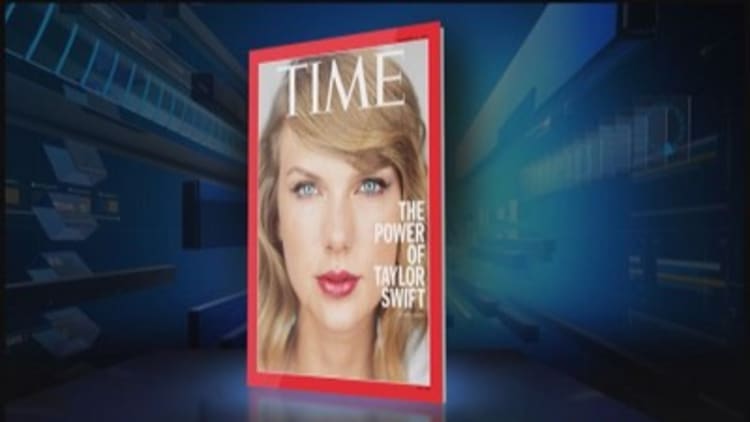You know about the Gregory Brothers, right? They're the family band (three brothers and a wife) that gained celebrity status on YouTube by turning political stories into songs using that awesome technology called Auto-Tune.
Most famously, they created the "Bed Intruder Song," a 2010 music video based on a news story in Huntsville, Alabama, about a home invader. The song, with the unforgettable lyrics "Hide your kids, hide your wife," reached the Billboard 100, and the video has been viewed almost 124 million times on YouTube.
With that kind of Internet success, you'd expect the band to find other digital avenues to entertain their fans. And they have.
Evan, the oldest of the three brothers at age 35, is currently blowing up on a mobile app called Sing! Karaoke, developed by tech start-up Smule. All it took for Gregory was recording a version of Meghan Trainor's smash hit "All About That Bass," which he performed from his studio in Brooklyn a couple weeks back, while wearing pink sunglasses and a plaid button-up.
People aren't just listening to Gregory's rendition—they're joining him. Smule has a duet feature for the Sing app, which until late last month was only available in audio. When the company recently added video, Gregory gave it a whirl. Since posting his side of the duet, more than 28,500 people have joined from all over the world to upload duets that have been viewed a total of 71,000 times.
Read MoreEvan Gregory's rendition of "All About That Bass"
"As if it wasn't compelling enough to be duetting with someone from Indonesia randomly, the video component makes it easy and fun," Gregory said in an interview. "People just got on board with it. It went mini-viral within the community of Sing users."
Fairus Adam, a singer from Singapore, uploaded a duet, with Gregory that's been viewed almost 1,400 times. Take a listen folks—this is true entertainment.
"The song is just so funny," Gregory said. "It fits our personality. And really, who isn't all about that bass?"

By no means is Gregory's cover yet reaching YouTube popularity as far as his family goes, but for one video using a newly launched feature with virtually no promotion, "that is a fairly insane number of new songs," said Jeff Smith, chief executive officer of San Francisco-based Smule.
It's all part of a grand experiment by Smule, which is trying to create a booming business through the most unlikeliest means. For starters, music start-ups don't tend to succeed. Pandora is the notable exception, and even after 15 years, the music streaming company is struggling to make money because it sends more than half its revenue back to the music industry. Spotify's on-demand service is certainly popular, but we don't yet know if the finances work.
Furthermore, Smule is a subscription-based mobile app developer, meaning it's actually asking consumers to pay for entertainment. For $8 a month or $40 a year, users can get unlimited access to Smule's Sing catalog as well as its Guitar, Magic Piano and AutoRap apps. Smule offers a teaser service for free, but users quickly find that all the good stuff costs money.
Read MoreSwift, Spotify and download death
It's still early, but Smule is finding that, for a truly enjoyable—even addictive—experience, users will pay. Smule has three of the top 10 grossing music apps in the Apple iOS and Google Play stores. Revenue at the company is set to double this year to about $40 million, Smith said.
"We've turned the Internet into a big campfire," said Smith, who has a doctorate degree in computer music from Stanford and started his software career at IBM's Scientific Research Center. "We've carved out a market opportunity around music."
Smule was founded in 2008, and has raised over $40 million from investors including Bessemer Venture Partners, Granite Ventures and Floodgate.
The Gregory Brothers have a more formal partnership with Smule through a co-branded app called Songify, downloaded by more than 9 million people who want to turn their speech into songs.
Read MoreSmartphone insecurity
In addition to sharing in the revenue from Songify, the brothers have several of their songs available on Sing as well as Smule's Guitar and Magic Piano apps, where users can play the tunes on virtual instruments. Any time a song is streamed, the band gets a royalty—just as Meghan Trainor does whenever Evan, or anyone else, attracts a listener to "All About That Bass."
For Gregory, nailing the falsetto in a cover song is just promotional. Hopefully it drives people to the Gregory Brothers website, which could lead to the purchase of a CD or T-shirt, or to some videos on YouTube, where the family makes ad revenue.
As far as actually making money from his Sing app popularity, Gregory isn't worried. After all, he can just flip on the computer while sitting around in his boxers and put a video together.
But he does see some similarities to that other video platform, the one where the Gregory Brothers turn presidential debates into songs that get viewed by millions of people.
"Is Sing going to be the breakout app that makes that cultural breakthrough happen? I don't know," Gregory said. "It has all of the tools very high social engagement. You have very talented people that bubble up to the top, the same as in the early days of YouTube."


